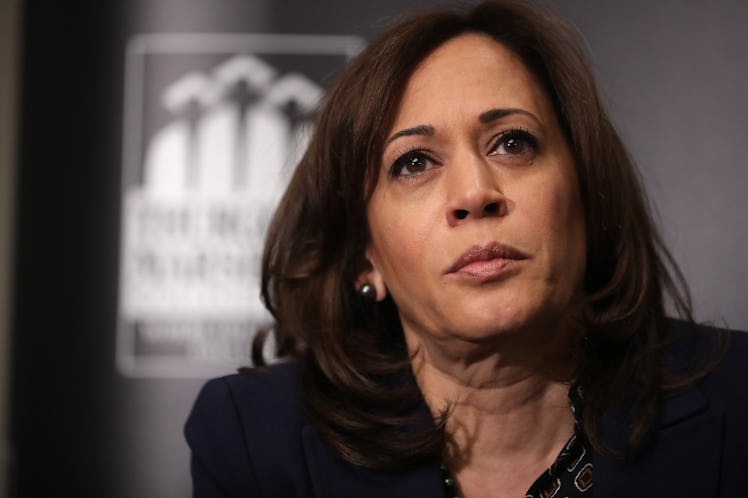
Kamala Harris Promised To Put This Feminist Issue Front & Center If She Wins In 2020
The 2020 election race is heating up as more and more candidates continue to throw their name in the running. Among those revving up to take on President Donald Trump is California Sen. Kamala Harris, who has her eyes set on some major forward movement on the women's rights front. Harris recently said that she plans to make the Equal Rights Amendment (ERA) a top priority if elected president, and it's quite a statement. So, what is the ERA? This has been in the works for awhile.
While recording a podcast taping of Political Party Live in Cedar Rapids, Iowa, released on Feb. 26, Harris was asked by an audience member what she'd do for women in her first 100 days in the White House — should she win in 2020. Harris said that she'd like to first turn to the economy and "lift the economic status of women," and "that means passing the ERA," she said. "Let's start there."
The Equal Rights Amendment (ERA) is a proposed addition to the U.S. Constitution that has been in the works for, oh, decades. The proposed amendment would "guarantee equal legal rights" for every citizen "regardless of sex," and also end "legal distinctions between men and women in terms of divorce, property, employment, and other matters," according to EqualRightsAmendment.org, a website dedicated to advocating for the ERA. The amendment was originally introduced by activist Alice Paul 1923, and didn't pass Congress until the 1970s, when it went to the states to be ratified. That's where it stalled. And while the country has made quite a bit of progress since then, the ERA would still be a major win for feminism and women's rights.
The main advantage to the ERA is that it would solidify gender equality into the Constitution, which would make it harder for women's rights under the law to be overturned. By codifying that men and women have the same legal Constitutional rights, advocates say that the ERA would federally guarantee equal pay, hopefully helping to close the wage gap, as well as providing legal defenses against gender and pregnancy discrimination and even gendered violence.
While the equal protection clause of the 14th Amendment to the Constitution guarantees protection, it hasn't always been applied to women. In fact, women are not explicitly mentioned in the Constitution at all except for the 19th Amendment, which codified women's right to vote. The ERA could fix that but, as of May 2018, only 37 states have ratified the Amendment, just one short of the number needed to ratify it into the Constitution (in theory) according to CNN. In practice it's a little more complicated, thanks to a 1982 deadline to ratify it, according to The New York Times. Because of the missed deadline, once 38 states get on board, organizers will have to lobby to Congress to recognize the ratifications.
While it seems like a no brainer, there has been some pushback to the ERA, with opponents like anti-feminist Phyllis Schlafly arguing that it would in fact hurt women, requiring them to be drafted into military service or take away social security benefits for widows. The pushback against the proposed amendment has generally assumed that women don't need the ERA, and that women are doing better than ever.
But with modern-day anti-sexism and harassment movements like #MeToo and #TimesUp, the conversation has been put back on the table. During a May 2018 event on Capitol Hill, actress and activist Alyssa Milano, who has been active in the conversation around #MeToo, told the crowd that empowering women is pretty difficult when they aren't even "recognized as part of our Constitution," and that's why the ERA is needed, according to CNN.
The ERA is one of the biggest feminist issues to look at when trying to move the dial forward, and so it makes sense that Harris has her eye on it should she strut into the Oval Office in 2020. No matter what you think of the proposal itself, it's a bold move.